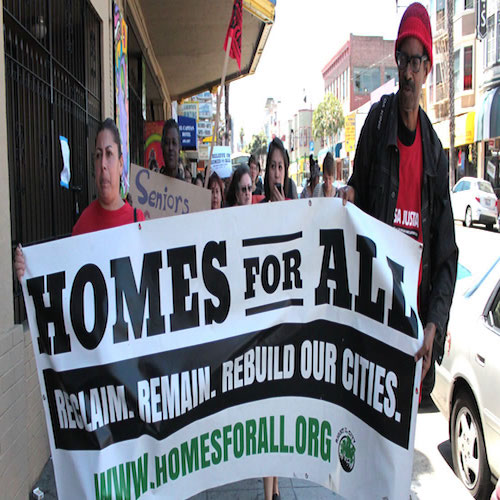Store owners make caring their business
Pinata District shoppes have found a way to make relationships with the resident homeless work both ways.
Fifteen years ago, before filling with colorful papier mache works of art and bursting with candies, the Los Angeles Pinata District was a place where pallets of produce lay stacked along the sidewalks. But this is not a tale of shrinking sales or economies; it’s a story of a growing alliances of an unexpected sort—one between the business owner and the homeless.
Jose Saavedra was just a boy then, working in his girlfriend’s family run store, El Cora Productos, when a man named Raymond began showing up at the storefront regularly. He came in dirty clothing, looking a little worse for wear; and he was. Raymond, then newly homeless after having lost his job and solidity in his marriage, had nowhere to go.
Reluctant to give him money because of the high percentage of homeless that have or develop a drug dependency, and because Raymond kept his liking for marijuana no secret, El Cora began allowing him to sweep the leaves of bundles of produce brought to the market that morning, and sell the wooden shipping pallets that would be left over from their arrival.
In exchange for sweeping, Raymond received produce. Sales of the pallets brought him $2.75 to $3.50 with which he could do whatever he pleased.
About a year later, in 2001, Saavedra and Raymond were conversing when it became clear how close the bond between the two had become.
“He said to me, ‘you know, we see each other every day.’” Saavedra recounted. “’We talk. It feels like you’re my family out here; you’re like my nephew.’”
Four years later in 2005 there was a period of time that Raymond stopped coming around. But he popped back up, and that’s when things really fell apart.
“For whatever reason, extreme weather, just being alone in the streets and maybe being without his family, he fell into drugs,” Saavedra said. “It started just as weed, but from weed it went to crack.”
The pattern is not unfamiliar to Saavedra, who chooses not to call those he knows ‘homeless’ but merely ‘friends.’ Gerald, another friend, found his way to El Cora in 2003 after his wife forced him from the home. Saavedra observed his drug use and, just like Raymond, he too disappeared for some time.
When Gerald re-emerged two or three years later, he had a car with a nice sound system. He had put on weight and was back with his wife. Saavedra voiced to Gerald his concern that he was back in the area where he used to frequently do drugs. Gerald assured Saavedra that he was just dropping by to say hello.
It was only a week before he saw Gerald on the streets again. He’s still around today.
The friendships formed with Raymond and Gerald are not anything that Saavedra considers unusual. What he does find strange is when others feel that his speaking to and helping the homeless on a regular basis is weird.
“These people have fallen on hard times and have found it hard to pick themselves back up again,” Saavedra said. “We all fall on these hard times ourselves at some point and we can thank God we have our families to lean on.”
Saavedra said the title of nephew which Raymond gifted him doesn’t make him feel closer to the man as much as it grounds him.
“It reminds me that we are all equal,” Saavedra said. “No matter our race or position.”
Asked to be introduced to Raymond, Saavedra’s tone was guarded, and his face affected. Raymond, he said, was not doing so well off of his medications and was not the safest to speak to when he was in such a condition.
It was his sister, Dulce Saavedra, a cashier at the family’s JCJ General Merchandise just a few blocks away, who pointed Raymond out as she passed him by.
In tattered, all black clothing from head to toe, Raymond leaned on a shopping cart lightly filled with items. With nothing in his ear to indicate a cellphone connection, Raymond stared into space while speaking to no one in particular, busily scribbling notes onto the crumpled sheets of a mini paper pad.
Dulce holds a similar opinion to her brother in regards to the homeless. Her sentiments, however, lie a little closer to her heart.
In a small cutout in the back of JCJ’s building exterior, Dulce shows me where one of the homeless men she helps has stuffed his belongings.
“This is his home,” she said, her voice hushed.
Whereas her brother’s ‘friends’ had always been on the streets when he befriended them, Dulce has watched a close companion slowly slip away into them. It is for this reason that she has a tenderness for them.
“I know in reality one day I’m going to see him on the streets,” she said. “He’s been on the streets for almost seven years now. Within two months I saw a big change and it’s heart breaking. Drugs took him over.”
On a cold and windy Black Friday, none of the three men that she regularly helps were around to benefit from either the homemade Thanksgiving leftover meal someone had dropped by or the extra blankets she’d brought to help them stay warm.
On cold days like these, Dulce explained, if they are clean, they go to the shelter—the same shelter where she believes her dear friend may be.
The relationship with the homeless who stay near JCJ is slightly more complex than at El Cora Produce. When her father, owner of JCJ sees that the friends they regularly help are no longer clean, he temporarily stops giving them food as a way to encourage wellness and the good habits of being sober.
“When they are clean, we give them what we can. One asks for food, the other asks for money,” Dulce said. “Me, personally, I believe that it is more important for them to get fed than to get money for their drugs. They need someone to encourage them, if possible, 24 hours per day.”
Both Dulce and her brother are quick to point out that the relationships they’ve fostered are mutually beneficial. For store owners and operators like the Saavedras, the friendships have lead to a sort of early warning system when more aggressive homeless arrive.
Shifts in the homeless population in the area are palpable. Without reading reports about the 12 percent increase in the number of homeless on the streets over the past two years, Dulce knew by observation that the count had grown. She could not only see, but feel the rising tension of what has now been called an epidemic of homelessness in L.A.
John Kwon, owner of The Dream Market just across the street from JCJ Merchandise said that when there is an influx, the neighborhood gets loud and fights break out more frequently—particularly at night. But it always slows down eventually.
“After a while the ones that come in stealing, they start to come to the counter with 10 cents or a quarter for the bottle of water or the beer,” Kwon said.
Saavedra believes the violence is a result of new incoming homeless both trying to assert themselves and yet feeling in danger of being rejected. He said the following switch into calmer streets comes about just like a relationship with anyone else.
“When you build a relationship and try to understand, you break down the stereotype,” Saavedra said. “Then they’re people, not criminals.”
On the other side, Dulce expressed there is a certain amount of reason to be used. When it comes to those with great mental illness—for example stripping nude as happened a couple of weeks ago—police are called not for the safeguarding of business, but to protect the vulnerable mentally ill.
But it’s a fine balance. The several who are harmless and stay in the area, Saavedra says, have become community watch members warning newcomers against theft and informing them how things work in these parts of Skid Row’s outskirts.
“Where we are, they know us and we know them,” said Saavedra. “They don’t need to worry about having to steal. It’s like a family.”
His sister, Dulce, agrees.
“You give them what you can.”


